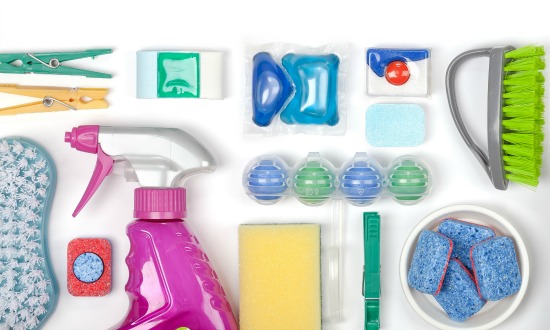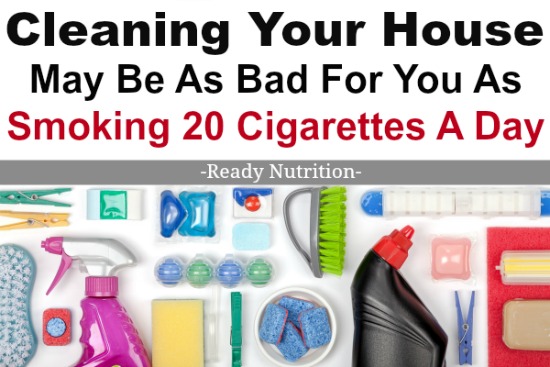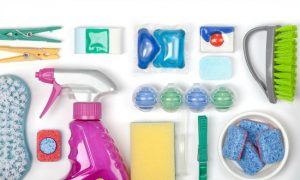
A recent study published in the American Journal of Respiratory and Critical Care Medicine [1] claims that regularly using house cleaning products could be as bad for your health as smoking a pack of cigarettes a day. Although it’s difficult to imagine cleaning could be just as detrimental to one’s health as smoking, the research suggests that the chemicals in cleaning products that get inhaled are actually just as bad.
According to an article by [2]Forbes, [2] researchers at the University of Bergen and Haukeland University Hospital in Norway calculated what happened to two common measures of lung function over time among 6,235 people who were part of the European Community Respiratory Health Survey. The first measure is the forced expiratory volume in one second (FEV1), or the amount of air you can expel from your lungs in one second. The second measure is the forced vital capacity (FVC), which is the total amount of air you can blow out of your lungs after you’ve taken the deepest breath possible.
These measurements were used to determine the lung health and vitality of those participating in this study.
While both of these measures tend to peak between 20 to 25 years of age and then afterward decrease gradually with age, the study found that the FEV1 and the FVC decreased faster (3.6 and 4.3 ml per year faster) for women who regularly cleaned their own homes than those who did not. The declines were even faster (3.9 and 7.1 ml/year faster) among women who worked as cleaners compared to those who did not work as cleaners and did not regularly clean their own homes. Also, asthma was more common (12.3%) among women who cleaned their homes (12.3 percent) or worked as cleaners (13.7%) than those who did neither (9.6%). These declines in lung function were comparable to those seen in people with a pack-a-day cigarette smoking habit. -Forbes [2]
This does raise concerns about the chemicals we all use to clean our home and the effect on our lung health. Natural or homemade cleaners are most likely the safest way to go. Consider making your own laundry detergent [3] and cleaning supplies in the comfort [4] of your own home. This way, you control exactly what you’re putting into the air that your family breathes in.
Related: Homemade Natural Cleaners Should Be Included in Emergency Preps [4]
Although this was not the most pristine study on the chemical components in cleaning supplies, other factors such as age, and overall physical health were seemingly ignored. But it is important to know that this is not the first study to look at the potential hazards of using harsh chemicals to clean. The American Lung Association [5] has warnings on their website about the effects of ammonia, bleach, and a variety of other volatile organic compounds (VOCs) [6] in cleaning products can irritate the eyes, throat, and lungs. These chemicals and compounds may even lead to chronic respiratory problems, allergic reaction, headaches, and even cancer.
Also adding to the concern is that fact that not all chemicals are listed on most cleaning supplies. There is no law in the United States mandating that manufacturers accurately label their cleaning products. Again, this is a good time to mention how avoidable this really is by making your own cleaning supplies. However, if you choose to use up the cleaners you’ve already purchased, try taking precautions such as ensuring you are in a well-ventilated area and attempt to avoid direct inhalation. Opening doors or windows can make a big difference; so can turning on fans.
If you don’t want to make your own cleaners or don’t have the time, look for ingredients such as baking soda, vinegar, [7] or rubbing alcohol. Baking soda is a pretty powerful scrub that can be used to clean toilets and tubs. Vinegar will clean floors really well and alcohol can disinfect kitchen countertops. For a fresh scent and naturally clean house, you can also use lemon juice to get the job done. [8] There are a whole lot of DIY recipes for cleaning supplies out there, but if you’re new to the game, consider watching the following video.
*Remember to make sure you are using the correct product for the job. Lemon juice can damage some surfaces. [8]
This video will lay the groundwork for your new and safer cleaning routine. And the added bonus besides health improvement to making your own cleaning supplies? You’ll save a boatload of money! Now that’s worth getting excited about!

